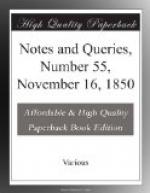ROBERT COLE.
Mrs. Partington.—Mr. Greene, the witty editor of the Boston (N.E.) Post, is believed to be the original of Mrs. Partington: at least he fathers all her sayings. He began to print them about twelve or fifteen years ago.
G.M.B.
[G.M.B. has also kindly forwarded
to us some of “Mrs. Partington’s
Queries from a recent
number of the Boston Post, from which we
select a couple of specimens,
viz.,—
“Whether the Emperor
of China is a porcelain statue or a mere
fiction?”
“Is the Great Seal alive, or only stuffed?”]
The East Anglian Word “Mauther" (Vol. ii., pp. 217. 365.).—Skinner’s note on this word is
“Mawther, vox Norfolciensi agro peculiaris: Spelman ipse eodem agro ortus a Dan. Moer, Virgo, Puella, deflectit. Possit tamen et declinari a Belg. Maegd, Teut. Magd, idem signante, addita term. er vel der, ut in proximo agro Lincolniensi in vocibus Heeder et Sheeder quae Marem et Feminam notant. Author Dict. Angl. scribit Modder, et cum Kiliano deducit a Belg. Modde, Moddeken, Pupa, Puella, Virgincula.”—Etymol. sub voce.
Webster merely gives (with strange neglect, having Skinner before him): {412}
“Mauther, a foolish young girl(not used).”—Ben Jonson.
Skinner is, I believe, wrong in assigning the r termination to the Danish word. Such a termination of the word maid is not to be found in any of the Teutonic dialects. The diphthong sound and the th appear frequently; as,
1. Moeso-Gothic: Magath
or Magaths; Mawi,
dim. Mawilo.
2. Anglo-Saxon: Maeth,
Maegth, dim. Meowla.
3. Old-German: Maget.
4. Swedish: Moe.
5. Norse: Moei.
I therefore suppose the r termination in mauther to be a mere corruption, like that pointed out by Skinner in the Lincoln Folk-speech: or is it possible that it may have arisen from a contusion of the words maid and mother in Roman Catholic times? In Holland the Virgin Mary was called Moeder Maagd,—a phrase which may possibly have crossed over to the East Anglian coast, and occasioned the subsequent confusion.
B.H.K.
P.S. Do the words modde, moddeken, quoted by Skinner, exist? and, if so, are they Dutch or Flemish? I have no means of verifying them at hand.
[On referring to Kilian’s
Dictionarium Teutonico-Latin-Gallicum (ed.
1642), we find, “MODDE,
MODDEKEN, Pupa, Poupee.”]
Cheshire Cat (Vol. ii., p. 377.).—A correspondent, T.E.L.P.B.T., asks the explanations of the phrase, “grinning like a Cheshire cat.” Some years since Cheshire cheeses were sold in this town moulded into the shape of a cat, bristles being inserted to represent the whiskers. This may possibly have originated the saying.




